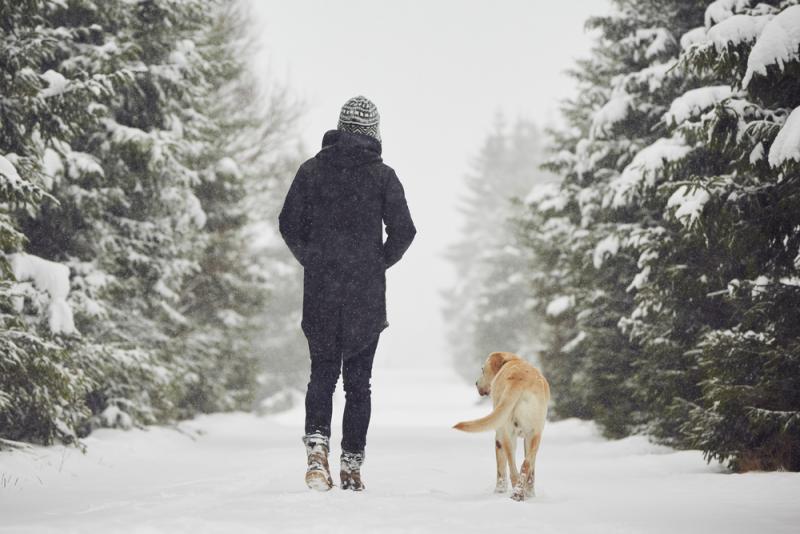
Cold weather can be harmful to our pets in ways some of us don’t realise - it can even cause serious illness or death.
We know you want to look after your fluffy friends in the colder months, so here’s our top tips for winter pet care.
How cold weather affects pets
British winters can be bitterly cold, and temperatures often fall below zero.
Taking your dog for a walk on a very cold day or letting your cat out in the evening could be dangerous during this weather. These dangers could include:
- hypothermia
- frostbite
- dehydration
- antifreeze poisoning
How to keep your dogs and cats safe in the cold
Dogs and cats need similar care in cold weather. Take the following steps to keep them safe and warm:
Check your pet’s paws
It’s common for local councils to spread salt and grit on roads and pavements in winter, but this can actually be harmful for pets.
According to the RSPCA, if your pet ingests rock salt (salt and grit), they can experience:
- thirst
- vomiting
- lethargy
- convulsions
- kidney damage
Check there’s no grit or salt in your pet’s paws or fur before, during, and after their time outside.
You should also check for small chunks of ice lodged in your pet’s paws, as these can become painful if they're left there.
Antifreeze is very dangerous to pets, and can cause kidney damage and even death. This is commonly found around cars and can easily rub onto your pet’s paws or fur if they get too close.
So, be careful about letting your pet near cars during winter, too.
Keep your pet warm and dry
Dogs and cats can suffer from frostbite, mostly on the ears, paws and tail.
They're at risk if:
- the ground is frozen or snow-covered
- they're outdoors for a long period of time
- they're wet in low temperatures
Make sure that if it’s snowing or raining, you dry your pet as soon as they get indoors, and don't leave them outside for too long.
Provide a coat for extra warmth
A lot of people give their pets a coat in wet or cold weather, either to keep them dry or just to provide some extra warmth.
You can buy pet coats in physical and online stores, and they come in a range of sizes so you can find the right fit.
Steer clear of toxic plants
There are some common winter plants that can be toxic to dogs and cats. These include:
- mistletoe
- ivy
- holly
- poinsettia
- yew
- winter cherry
- Christmas trees
Keep an eye on your pet when they’re outside to make sure they’re not eating anything like this.
Try to avoid keeping these plants in your home, as it makes them a lot easier for your pets to access.
If you’re putting up a Christmas tree, consider putting a barrier around it or placing it in a room that your pet doesn’t go into.
At Christmas, you should also avoid giving your pet festive foods, like Christmas pudding, mince pies and chocolate.
Stick to pet-friendly treats that you know won’t cause any harm.
How to keep animals warm when indoors
If you have any indoor small animals or an indoor cat (or a cat that’s reluctant to go outside), the cold can still be a problem at times.
Even dogs can be affected by the cold when indoors. While they won’t be exposed to snow and rain, our homes can get very cold in the winter, especially during the night.
Follow these steps to keep your animals safe and comfortable in winter:
- put the heating on in the early morning and night for a little bit
- give them blankets or extra straw where possible
- keep their beds or enclosures away from windows and doors
- think about buying a heated pet bed
What to avoid in pet care during winter months
To keep your pet safe in cold weather, avoid:
- leaving your pet outside for long periods of time, or overnight
- letting your pet roam freely on pathways or roads
- leaving your pet alone in a cold or heated car
- allowing your pet to walk on frozen lakes or ponds
What temperature should my dog or cat be?
Very cold weather can cause discomfort and even hypothermia in pets.
According to VCA Animal Hospitals, dogs and cats’ normal internal temperature should be between 38.3°C and 39.2°C.
If your pet’s temperature goes above or falls below this range, you should contact your vet.
When should I avoid walking my dog?
Any temperature below -4°C will be very uncomfortable for small and medium dogs, so it’s wise to avoid going out in these conditions.
It's also best to avoid taking older dogs out for a walk in very low temperatures.
When should I avoid letting my cat out?
Any temperature below -7°C is dangerous to your cat, so avoid letting them out in these conditions.
Be extra wary of letting older cats out in low temperatures, as the cold can affect their joints more than younger cats.
If your cat's stuck indoors for a few days because of the weather, they can still have fun. Make sure you play with them a few times a day and give them toys to keep them stimulated.


